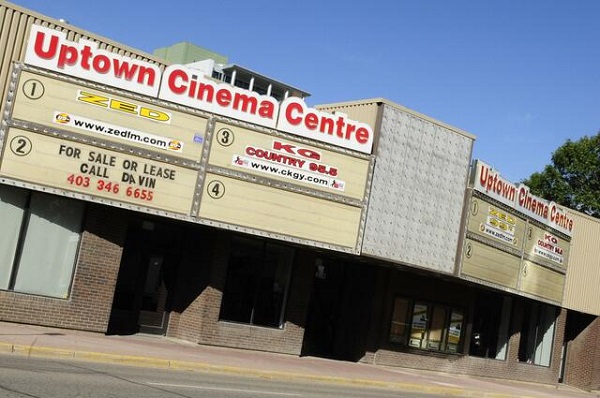Business
Carnival Cinemas moving downtown: Owner Bill Ramji buys former Uptown Cinemas from RDP

News release from Red Deer Polytechnic (RDP)
Red Deer Polytechnic Sells Welikoklad Event Centre
Red Deer Polytechnic (RDP) has sold the Welikoklad Event Centre in downtown Red Deer to a new owner who has plans to revitalize the facility as a movie theatre. RDP purchased the Welikoklad Event Centre in 2012. For many years, the Centre served as a valuable learning space for students in a variety of programming, including arts and business. The facility also served as a community hub, where RDP hosted a variety of events for different organizations. With the evolution of time, and RDP’s mix of industry-relevant arts and business programs transitioning back to main campus, the Welikoklad Event Centre no longer serves the same purpose for the post- secondary institution as it once did.
“As we’ve reviewed our future strategic plans relating to program growth and facility usage, to best serve our students, industry partners and community members, we are confident we can meet everyone’s needs at our other campuses,” says Jim Brinkhurst, Vice President, Finance and Administration & Chief Financial Officer, Red Deer Polytechnic. “We feel that now is a good time for the institution to sell this facility and we are pleased to see it repurposed for other community uses that will continue to serve Red Deer and downtown well.”
The Welikoklad Event Centre has been purchased by local business owner, Bill Ramji. He owns Carnival Cinemas, currently located in the Capstone neighbourhood. Future development is planned on the current site of this movie theatre and community gathering space. Ramji is excited to revitalize the theatre’s nearly three decades of history in Red Deer at its new location (which will be renovated before opening) in the heart of downtown.
“Carnival Cinemas is proud to announce the acquisition of the Welikoklad Event Centre from Red Deer Polytechnic, marking an exciting new chapter for this venue and the downtown arts community,” says Bill Ramji, Carnival Cinemas owner. “With this acquisition, Carnival Cinemas reaffirms its commitment to bringing the best value in movies to central Alberta while expanding its focus on supporting local theatre and the performing arts. The Welikoklad Event Centre, previously The Uptown Theatre, was a hub for film lovers and creative voices, and Carnival is eager to build on that legacy.”
Ramji continues, “We’re excited to move forward as Carnival Cinemas and Event Centre and our goal is to continue providing high-quality movie experiences, while also working hand-in-hand with local artists, performers, and theatre groups to enrich downtown Red Deer’s cultural landscape. Carnival Cinemas & Event Centre looks forward to collaborating with the arts community and the broader public to ensure the space remains a vibrant and inclusive gathering place for film and theatre alike.”
RDP will continue to have a presence in downtown Red Deer, with their downtown campus located in the Millennium Centre. The downtown RDP campus is home to RDP’s Continuing Education and Corporate Training programs.
Business
Feds pull the plug on small business grants to Minnesota after massive fraud reports

The Small Business Administration is moving to freeze grant money flowing into Minnesota after explosive allegations of large-scale fraud tied to state oversight failures, with SBA Administrator Kelly Loeffler signaling an immediate crackdown following recent independent reporting.
In a series of comments shared publicly by conservative commentator Benny Johnson, Loeffler said the agency is “cutting off and clawing back” SBA grants to the state while investigators dig deeper into what she described as a rapidly expanding fraud network.
Johnson wrote that Loeffler told him she was “disgusted and sickened” after reviewing footage from YouTuber Nick Shirley, whose on-the-ground reporting in Minnesota highlighted what he said were sham daycare and learning centers collecting millions in public funds despite showing little or no sign of legitimate operations.
According to Johnson, Loeffler blamed the situation on Democrat Gov. Tim Walz, accusing his administration of refusing to enforce basic rules governing small businesses and allowing fraud to flourish unchecked.
Johnson said Loeffler told him SBA investigators were able to identify roughly half a billion dollars in suspected fraud within days of focusing on Minnesota, calling the operation an “industrial-scale crime ring” that ripped off American taxpayers.
“Pending further review, SBA is freezing all grant funding to the state in order to stop the rampant waste of taxpayer dollars and uncover the full depth of fraud,” Loeffler said, according to Johnson’s account, adding that the total scope of the scheme remains unknown and could reach into the billions.
The controversy gained national traction after Shirley posted video of himself visiting multiple facilities, including a South Minneapolis site known as the Quality Learning Center, which he reported was approved for federal aid for up to 99 children but appeared inactive during normal business hours.
The center’s sign, Shirley noted, even misspelled the word “learning” as “learing.”
In the footage, a woman inside the building is heard shouting “Don’t open up,” falsely claiming Shirley and his colleague were Immigration and Customs Enforcement agents.
After the video circulated, Rep. Tom Emmer, a Republican, publicly demanded answers from Walz, questioning how such facilities were approved for millions in taxpayer funding.
Shirley’s reporting followed earlier investigations, including a November report by City Journal alleging that members of Minnesota’s Somali community had sent millions of dollars in stolen taxpayer funds overseas, with some of that money reportedly ending up in the hands of Al-Shabaab, a U.S.-designated terrorist organization.
While Walz’s administration has insisted it takes fraud seriously, the SBA’s decision to halt grant funding marks one of the most aggressive federal responses yet, underscoring how rapidly a local scandal has escalated into a national reckoning over oversight, enforcement, and accountability in Minnesota.
Business
Stripped and shipped: Patel pushes denaturalization, deportation in Minnesota fraud

FBI Director Kash Patel issued a blunt warning over the weekend as federal investigators continue unraveling a sprawling fraud operation centered in Minnesota, saying the hundreds of millions already uncovered represent “just the tip of a very large iceberg.”
In a lengthy statement posted to social media, Patel said the Federal Bureau of Investigation had quietly surged agents and investigative resources into the state well before the scandal gained traction online. That effort, he said, led to the takedown of an estimated $250 million fraud scheme that stole federal food aid intended for vulnerable children during the COVID pandemic.
According to Patel, the investigation exposed a network of sham vendors, shell companies, and large-scale money laundering operations tied to the Feeding Our Future case. Defendants named by the FBI include Abdiwahab Ahmed Mohamud, Ahmed Ali, Hussein Farah, Abdullahe Nur Jesow, Asha Farhan Hassan, Ousman Camara, and Abdirashid Bixi Dool, each charged with offenses ranging from wire fraud to conspiracy and money laundering.
Patel also said Abdimajid Mohamed Nur and others were charged in a separate attempt to bribe a juror with $120,000 in cash. He noted that several related cases have already resulted in guilty pleas, prison sentences of up to 10 years, and nearly $48 million in restitution orders.
Despite those outcomes, Patel warned the case is far from finished.
“The FBI believes this is just the tip of a very large iceberg,” he said, adding that investigators will continue following the money and that the probe remains ongoing. Patel further confirmed that many of those convicted are being referred to immigration authorities for possible denaturalization and deportation proceedings where legally applicable.
The renewed focus follows a viral video circulated by independent journalist Nick Shirley, which appeared to show multiple childcare and learning centers operating as empty or nonfunctional storefronts. The footage sparked immediate backlash from Republicans, including Vice President JD Vance.
House Majority Whip Tom Emmer accused Minnesota Gov. Tim Walz of sitting idle while massive sums were stolen from taxpayers. Walz addressed the allegations during a November press conference, before the full scope of the fraud became public, saying the scandal “undermines trust in government” and threatens programs meant to help vulnerable residents.
“If you’re committing fraud, no matter where you come from or what you believe, you are going to go to jail,” Walz said at the time.
Authorities say the alleged schemes date back to at least 2015, beginning with overbilling Minnesota’s Child Care Assistance Program and later expanding into Medicaid-funded disability and housing programs. One such housing initiative, aimed at helping seniors and disabled residents secure stable housing, was shut down earlier this year after officials cited what they described as large-scale fraud.
The fallout has already reached the federal level. Last month, President Trump announced the suspension of Temporary Protected Status for Somali nationals, arguing that Minnesota had become a hub for organized welfare fraud and money laundering activity.
-

 Digital ID1 day ago
Digital ID1 day agoCanadian government launches trial version of digital ID for certain licenses, permits
-

 Alberta1 day ago
Alberta1 day agoAlberta Next Panel calls to reform how Canada works
-

 Agriculture1 day ago
Agriculture1 day agoEnd Supply Management—For the Sake of Canadian Consumers
-

 Business1 day ago
Business1 day agoThe “Disruptor-in-Chief” places Canada in the crosshairs
-

 International1 day ago
International1 day agoGeorgia county admits illegally certifying 315k ballots in 2020 presidential election
-

 Artificial Intelligence1 day ago
Artificial Intelligence1 day agoUK Police Pilot AI System to Track “Suspicious” Driver Journeys
-

 Energy1 day ago
Energy1 day ago‘The electric story is over’
-

 International1 day ago
International1 day agoWorld-leading biochemist debunks evolutionary theory






